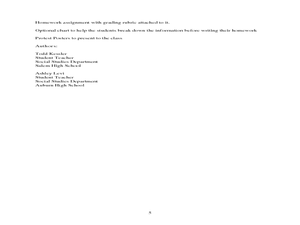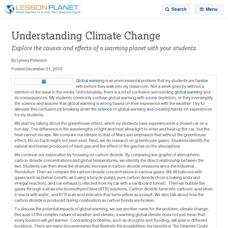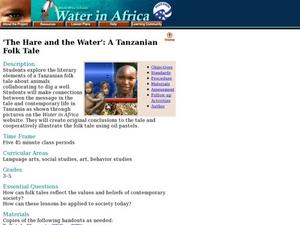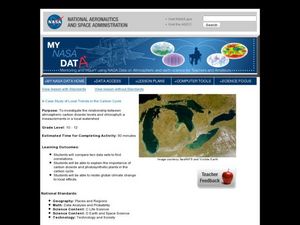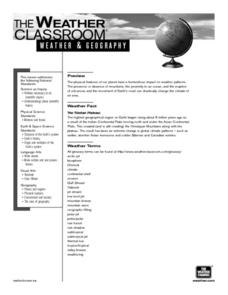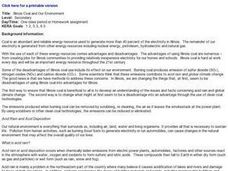Curated OER
Greenhouse Gases: The Chemistry Behind the Culprits
Ninth graders investigate the effect of different gases in the atmosphere. In this chemistry instructional activity, 9th graders explain how these gases contribute to global warming. They suggest possible solutions to this growing problem.
Curated OER
1968 – A Generation in Revolt
Tenth graders compare and contrast the revolts that took place around the world in 1968. In this global studies lesson, 10th graders research the youth revolts that took place in Paris, Prague, and Chicago in 1968 and create posters and...
Curated OER
California Suit on Car Greenhouse Gases Dismissed
After reading an (attached) article about greenhouse gases, students reply to six questions about what they've learned. This activity would fit well into an environmental science class, a government class, or a current events class...
Curated OER
High Wire Magazine: Turning Points
Develop and strengthen reading comprehension strategies through this comprehensive teaching guide. Your learners will practice making text connections, inferences, predictions, and more using reading passages from the teen-appropriate...
Curated OER
Clouds and the Earth's Radiant Energy System
Wow! What a lesson plan! Six terrific activities are described in great detail, in this 31-page document! Learners will model and explain cloud formation, sketch and identify certain cloud types, calculate and compare incoming and...
NASA
Precipitation
Here is a fabulous collection of lessons for your emerging meteorologists! In them, learners will utilize satellite data to determine distribution of rainfall, research global rainfall patterns, and utilize their knowledge to propose new...
Curated OER
Air: Fuel For Thought
Students consider the impact of vehicle use in their family and brainstorm viable alternatives to this use. They calculate the total emissions for their family cars during the week, then compare those totals with Hybrid car totals.
Curated OER
Understanding Climate Change
Explore the causes and effects of a warming planet with your students.
Curated OER
Global Climates and Seasons
Learners look at the differences that exist in all four seasons. The resources of animation are available to be used to illustrate scientific concepts in a media that is engaging to students.
Space Awareness
The Intertropical Convergence Zone
Young scientists know it is hotter along the equator, but why is it also rainier? Through the process of completing two experiments and a worksheet, scholars discover the answer is the intertropical convergence zone. First, they...
Curated OER
Interdisciplinary Global Warming
Ninth graders are given a wide variety of earth science topics to choose from to write a report on. This lesson plan also has a scoring rubric imbedded in the plan. They utilize the internet and other sources to complete their research.
Curated OER
Unit on Globalization and the Environment
Twelfth graders analyze issues affecting ecosystems. They examine the relationships between members of the international comunity. They also examine the concept of sustainable development.
Curated OER
Terrestrial Sequestration - Photosynthesis and Cellular Respiration
Learners investigate how plants absorb carbon dioxide during photosynthesis. In this biology lesson, students differentiate photosynthesis and cellular respiration. They discuss the important role of plants in the environment.
Curated OER
The Hare and the Water: A Tanzanian Folk Tale
"The Hare and the Water," a Tanzanian folk tale, lends a global perspective to literary analysis. Learners spend the first two days reading and storyboarding. On day three, they examine folk tale elements (worksheet included), and design...
Global Oneness Project
The Value of Ancient Traditions
Imagine having to give up cell phones, computers, and TV? What would be lost? What gained? An examination of the Drokpa, a nomadic people who live in the grasslands of Tibet, provides class members an opportunity to consider how access...
UAF Geophysical Institute
Carbon Footprint
Your young environmentalists can calculate their carbon footprint and discuss ways to reduce it with a worksheet about climate change. After reading a handout about what impact one's carbon footprint can have on the environment, kids...
Curated OER
Case Study of Local Trends in the Carbon Cycle
Students examine the relationship between chlorophyll and carbon dioxide in the atmosphere. In this investigative lesson students study the local effects of climate change.
Curated OER
Carbon Dioxide - Sources and Sinks
Where does all of the carbon dioxide come from that is supposedly leading to climate change? Earth science pupils test animal, plant, and fossil fuels as sources in this investigation. Using an indicator, BTB, they are able to detect the...
Curated OER
The Tibetan Plateau
Middle schoolers discuss the characteristics of the biosphere, with a focus on the Tibetan Plateau. They participate in a question and answer period discussing biomes and climate patterns. They compare and contrast different ecosystems.
Curated OER
Geography/Current Events Project
Using the Balkan region as an example, fourth graders review the five themes of geography as a class. They identify the physical and human characteristics of a region before labeling the countries and landforms on a map. They then...
Curated OER
Kentucky Coal and Our Environment
Students read and discuss the article in reference to the environmental issues of acid rain and global climate change in relation to Kentucky coal. They then answer questions that are related to the article that they read.
Curated OER
Illinois Coal and Our Environment
Students read and discuss the important environmental issues of acid rain and global climate change in relation to Illinois coal. According to the National Acid Precipitation Assessment Program, acid rain has had minimal effects on our...
Curated OER
The Three Little Pigs
Students divide into small groups and read the story of THE THREE LITTLE PIGS. Each group brainstorms a list of terms relating to energy efficiency and global climate change. Then they rewrite one page of the story of the book using as...
British Council
How Green Are You?
Go green! Scholars survey their classmates to determine how green they are and then write a report to summarize their findings. Finally, pupils agree on five changes they can make in their lives to help the environment.



